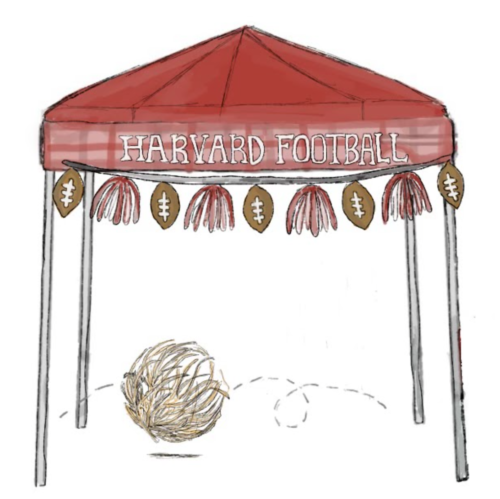It’s clear from the low attendance at football games that Harvard is not as full of sports or tailgate fans as most other D1 colleges in the country. Go to any home game or read any of the Independent’s articles citing the general lack of school spirit, and you will get a glimpse into the disappointing sense of apathy that seems to run rampant among our student body.
Because Harvard Athletics offers forty-two Division I intercollegiate varsity teams for women and men—more than any other DI college, we have constant opportunities to showcase our pride at athletic events. Still, we do not. While many factors contribute to this issue, the College’s strict tailgate guidelines may explain why students have historically found it hard to enjoy themselves at games.
Last year’s Harvard vs. Yale game, held at Harvard Stadium, offers an especially disappointing look into Harvard’s subpar tailgates and strict tailgating policies. Leading up to the game, Associate Dean of Students Lauren Brandt informed students that only Harvard-provided food and drinks would be allowed at the College-sponsored tailgate.
As a final blow, Brant announced the prohibition of other alternative pregame or tailgates, something which House Committees had previously been allowed to do before The Game. Needless to say, Harvard students left the stadium that night feeling jilted over having lost twice to Yale: both during the game in the realization that Yalies can host better tailgates.
In response to these tailgating setbacks, there seems to be a new wave of enthusiasm and dedication to improving gameday spirit at tailgates on campus. The student-led Harvard State account on Instagram, in particular, has gained popularity for consistently organizing tailgates before home games and urging fans to show up to games in theme. Albeit well-intentioned, this effort at generating more school spirit seems to still be overshadowed by Harvard’s limiting tailgate policies.
Harvard’s “Go Crimson” website, which lists pertinent gameday information from parking to concessions, takes a clear stance on tailgating. “Harvard University is a great place to tailgate; however, rules are strictly enforced!” Such rules include only being able to tailgate before the game, having to end right as the game begins, and not being able to be in possession of items that “promote the rapid consumption of alcohol.”
This no-nonsense approach to tailgating leaves both Harvard and non-Harvard students feeling disappointed. “I was expecting a little bit more energy there…If I remember correctly, [the tailgate] also got shut down pretty quickly which was definitely sad,” said Isabel Coxe, a Dartmouth junior who commuted to Harvard for the October 28th football game against Dartmouth.
In comparison to schools with a heavier Greek life campus, Harvard’s tailgate scene proves to be quite different—but not always for the worse. In fact, because of our lack of Greek life, Coxe notes that Harvard’s tailgates resemble the more traditional image of a tailgate than exclusive Greek parties. Although there is “certainly still drinking and events around the [Dartmouth] football games,” Coxe explained that Dartmouth tailgates “aren’t quite tailgates, so in that sense, Harvard gets bonus points for their tailgate culture.”
Additionally, for Boston College Sophomore Evan Buckley, it is clear that Harvard surprisingly wins out against other colleges for its centralized, student-focused tailgates. Whereas at Boston College “there are at least six major spots for tailgating that are pretty much run by parents out of their cars,” as Buckley explained, “at Harvard everyone is generally in the same spot” which allows the student body to gather in one space. So, while we may be quick to judge ourselves and believe that, as Julia Downey ’27 succinctly put it, “Harvard is not ‘all that’ when it comes to tailgating,” it’s important not to be entirely pessimistic about the potential we have to create enjoyable tailgate events.
“The Harvard vs. Brown tailgate was much better than I thought it would be, and even felt more like a fun concert or music festival than a tailgate,” Downey described. Even though the Harvard vs. Dartmouth tailgate proved “less exciting” than the Harvard vs. Brown equivalent, Downey says she’s still optimistic about Harvard tailgates, as long as we make it a priority to increase our collective spirit.
“I’d like there to be more underclassmen or representation from all grades because having two freshmen in a sea of seniors is not fun, nor is having the visiting students’ section always be more enthusiastic than ours,” Downey explained.
Overall, despite the administration’s clean-cut stance against tailgating policies, it is still more than possible to create memorable tailgating events throughout the year. Something as simple as encouraging your friends and classmates to show up at every game with the same spirit and passion as they would at the Harvard-Yale game is a great first step toward creating consistency at our tailgates. Maybe then other colleges will start to believe that it’s possible for us to work hard and play hard.
Ava Rem ’27 (avarem@college.harvard.edu) is hopeful that the Harvard vs. Yale tailgate this weekend will not be like the tale of last year’s.

